Disclosure: We may get commissions for purchases made through links in this post.
Permeable pavers catch water and store them in the reservoir underneath, making them an ideal environment for weeds to thrive. But do weeds grow through permeable pavers? We took a closer look into it to determine the answer.
Weeds grow on top of the pavers, not from the underground up. The wind carries them over then they take root as soon as they land onto the crevices. There are several methods to prevent and stop weeds growing, including:
- Sealing pavers
- Regularly sweeping pavers
- Properly installing pavers
Additionally, if you need to remove weeds before taking measures to prevent them, you can:
- Manually remove -using hands or tools
- Apply natural weed remedies
- Blow torch the weeds
- Spray herbicides
So how can you stop them from popping up on your pavers? That’s going to be the focus of the next chapters, so continue reading to learn more!
![Permeable pavers parking lot, Do Weeds Grow Through Permeable Pavers? [And How To Stop Them]](https://pavingplatform.com/wp-content/uploads/2022/02/Do-Weeds-Grow-Through-Permeable-Pavers-And-How-To-Stop-Them-800x1200.png)
Why Do Weeds Grow On Pavers?
Nobody wants weeds, but they are everywhere. Thanks to their omnipresent accomplice- the air. Once they invade the soil, it only takes them 12 weeks to sprout and grow in abundance.
What Are The Disadvantages Of Weeds?
First off, weeds just take up space in your outdoor hardscape. They also compete with garden plants for water and nutrients. Lastly, they neither have value nor provide structural appeal to your home. Not to mention the insects they attract that can bring in diseases.
How To Prevent Weeds From Growing On Pavers?
Here’s what you can do to prevent them from growing between or on your paving blocks:
Sealing
Sealing the pavers adds a barrier, preventing weed germination. Use sealant for porous surfaces only. Regular sealants defeat the purpose of permeable pavers -they clog the pores, prohibiting water from passing through.
How To Seal A Permeable Paver?
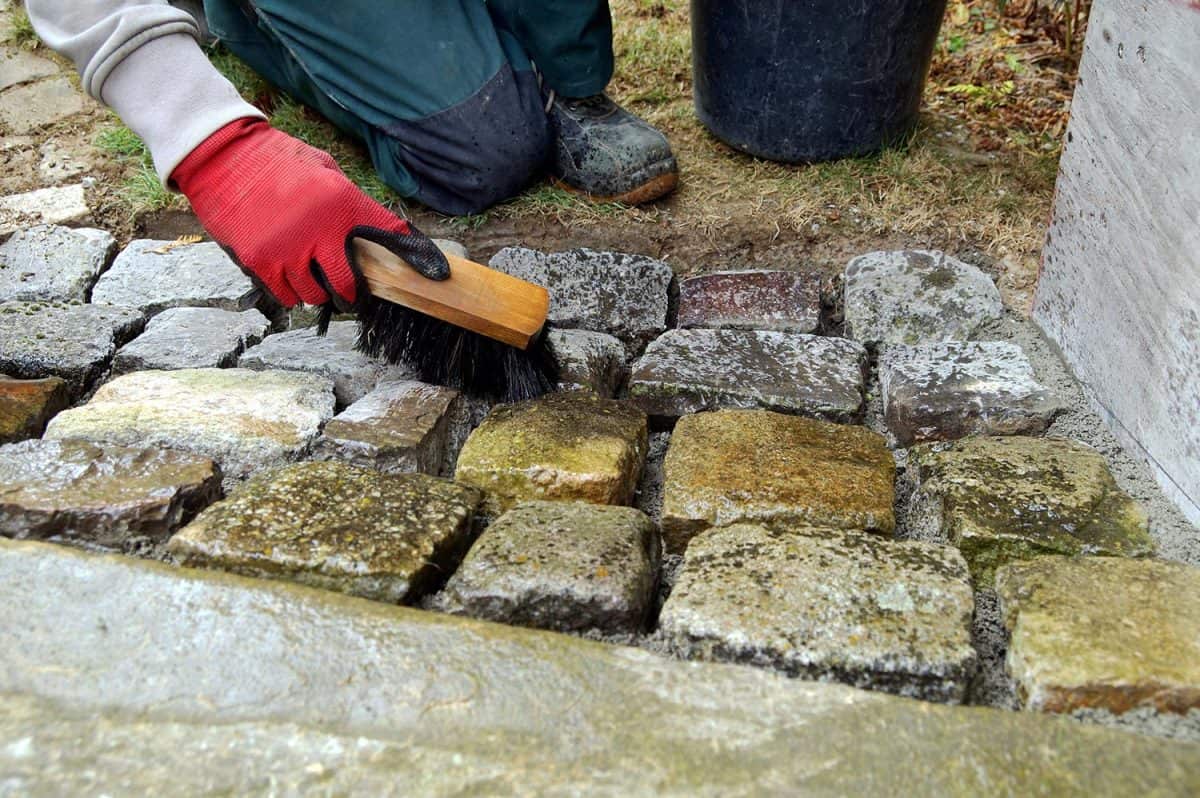
- Clean the surface to eliminate debris. They cause the sealant to blister and peel off.
- Pressure wash the pavers to blast away grime, stains, and oil. Sealant won’t adhere to a greasy surface.
- Treat and scrub stubborn stains, if necessary.
- Let the pavers dry completely.
- Proceed with etching. This opens the pores and makes the surface rough, creating a strong bond between both materials. You can use muriatic to acid etch. Also, vinegar, but that will take some time because it has mild acidity.
- Pour the sealer into a bucket, then start applying it on the surface with a roller. Use a brush for corners that are hard to reach.
- Let the first coat dry, then apply the second coat.
- Allow the sealant to dry and cure overnight.
Check out this product on Amazon.
Regular Sweeping
Doing so on a regular basis disrupts the weed seeds from germinating, hindering them from taking roots. Also, this keeps the curb appeal of your home.
Proper Installation
Improper installation of permeable pavers leads to wide joints, inviting the growth of weeds. It’s important to fill in those crevices to avoid lawn invaders.
How To Remove Weeds From Pavers?
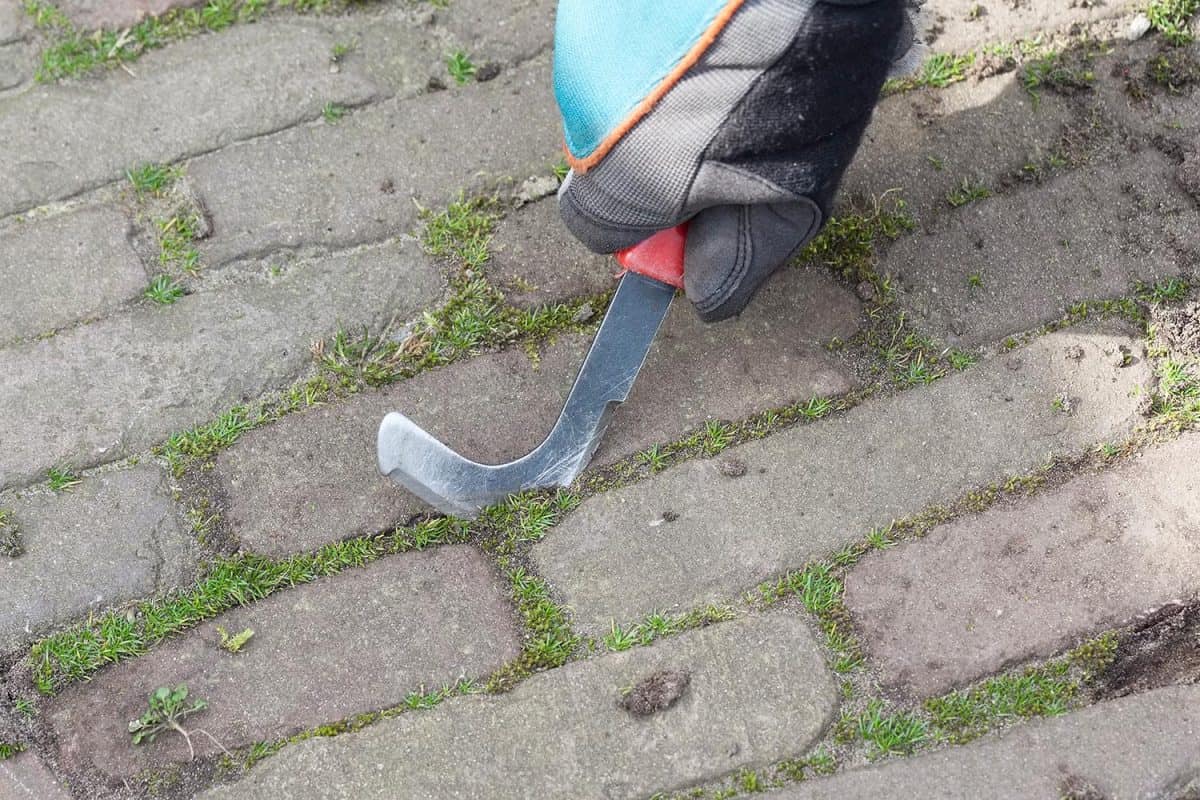
Have weeds already sprouted on your pavers? Try the following:
Manually Remove Weeds
This demands effort and appropriate tools to make the plucking easier.
- Wear gloves as you’ll be dealing with damp soil.
- Choose knee pads you are most comfortable with to keep your clothes tidy when you bend down.
- Prepare a dustbin where you’ll put the weeds you’ve collected.
- Break up the soil with a digging knife, then pull out weeds with a three-prong garden cultivator or cape cod weeder.
Best Tools To Remove Weeds From Pavers
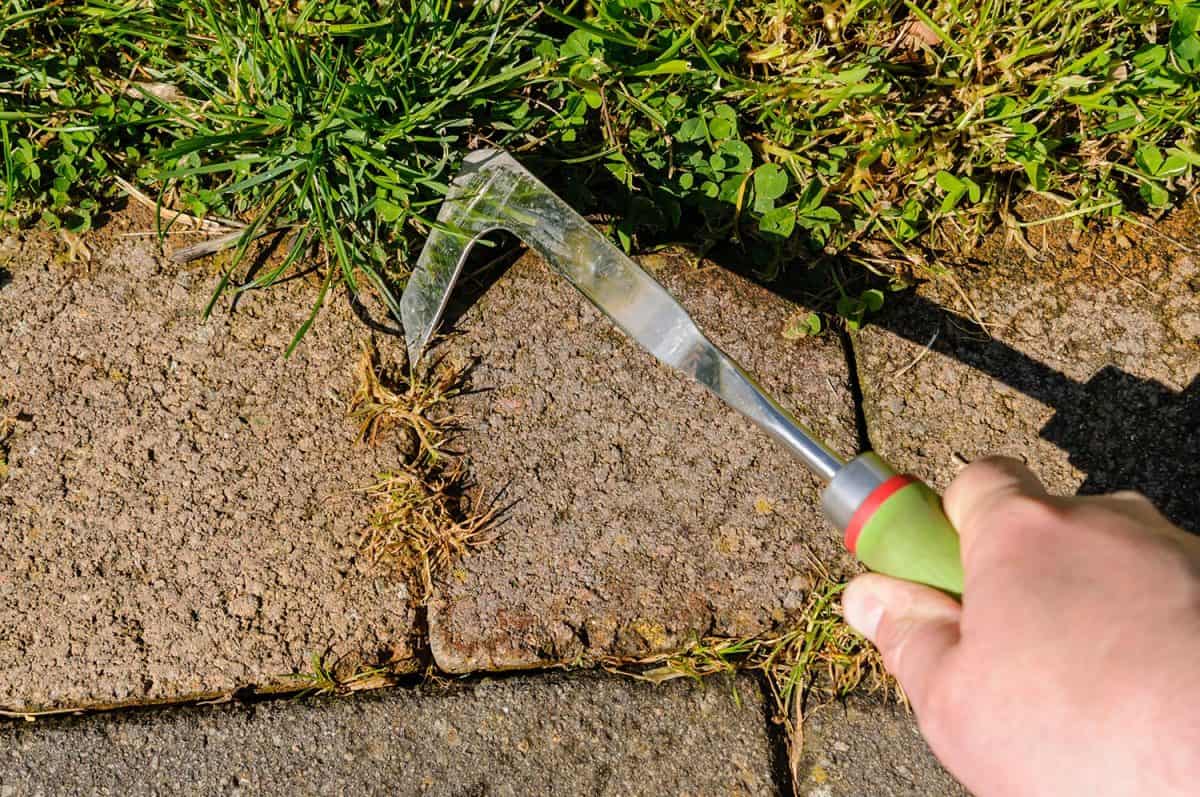
These tools can help you get rid of weeds more easily:
- Hand Weeder: has a slim sharp blade that cracks the soil between the paver joints that allows you to pull weeds out. Also, it is sturdy to handle hardcore weeding.
- Telescoping Crack Weeder: is used to extract weeds without kneeling down. It pulls up multiple weeds in one swipe
- Carrot Design Weeding Tool: features a slender blade for digging up or slicing off weeds.
- Weed Snatcher: fits nicely into crevices and lifts short weeds and moss.
Check out GREBSTK weed snatcher on Amazon.
Apply Natural Weed Remedies
You can also kill weeds using natural solutions that include:
- Baking soda: this contains sodium bicarbonate that absorbs water from weeds until they dry out and die.
- Vinegar: works in the same manner as baking soda. The acid draws out moisture from the weed, causing them to dehydrate.
- Boiling water: breaks down the weed’s cellular structure, preventing them from absorbing nutrients. Eventually, they wither.
Blow Torch The Weeds
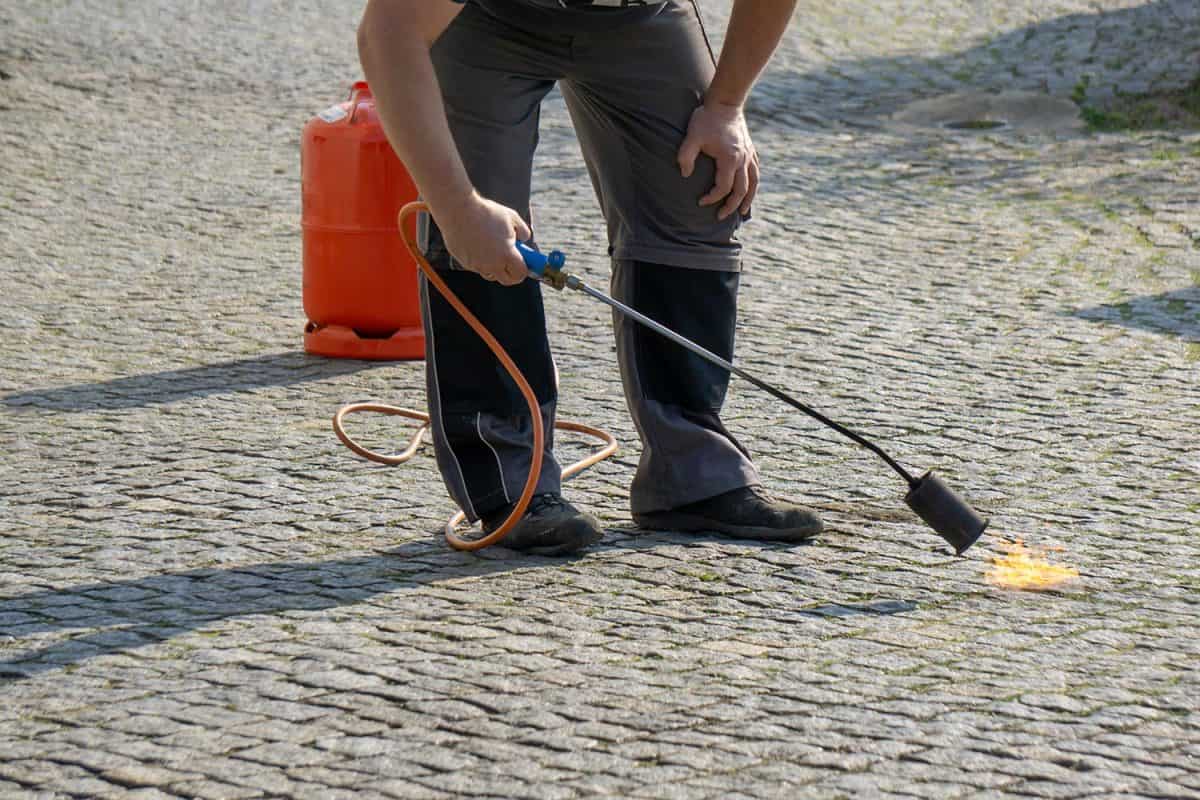
You can directly burn the weeds to the root using a blow torch. But proceed with caution to avoid fire accidents.
Spray Herbicides
These effectively control unwanted vegetation. See the best herbicides below:
Compare-N-Save Concentrate Grass and Weed Killer
A concentrated chemical with glyphosate that targets weed roots to ensure they are never coming back.
Click here to see it on Amazon.
Southern Ag Amine 2,4-D Weed Killer
Eliminates weeds in just three days! Unlike other herbicides, it preserves botanical grass and only kills unwanted plants, making it recommended for lawns.
Check out this item on Amazon.
Preen Garden Weed Preventer
This doesn’t terminate existing weeds, but the seeds that are getting ready to sprout. The rain cannot render it useless, each application lasts for three months.
Click here to see it on Amazon.
Disadvantages Of Herbicides
- Increased resistance- the weeds that survive develop stronger resistance to chemicals, making them harder to get rid of.
- Pollution- herbicides contain toxic substances that can get mixed in and contaminate the air.
- Health risks- direct contact or inhaling the chemical increases the risk of cancer and cell damage.
- Non-selective vegetation removal- some herbicides injure and kill crops and non-invasive plants.
- Water runoff- soil containing herbicides can run off to sea. This can hurt marine animals.
Is It Better To Dig Up Or Spray Weeds?
Both methods remove the whole grass including its root. The only difference is digging up weeds gets the job done without posing risks to the environment.
How Often Should You Seal Your Pavers?
It is recommended to reseal the pavers every two to three years. But it also depends on their exposure to factors that affect their condition such as climate, vehicular traffic, and pressure. You should reseal if you notice significant discoloration or wear on the coating.
Can You Use Polymeric Sand On Permeable Pavers?
No. Polymeric sand isn’t compatible with permeable pavers. Once they harden, they seal the pores on the surface, preventing water from getting through. Crushed rocks are used to cushion the paver joints.
How To Maintain Permeable Pavers?
Here are do’s and don’ts for maintaining pavers:
Do
- Inspect the pavers after a storm to see if the water drains through the gravel.
- Remove debris, moss, and leaves on the surface.
- Vacuum or pressure wash the pavers every year.
- Refill the stones after vacuuming or power washing to prevent shifting.
- Remove the snow or frost that blocks the pores.
- Repair structural damage as necessary.
Don’t
- Store sand, salt, and mulch; they clog the pavers.
- Ignore oil and gasoline spills, they cause premature deterioration.
- Use non-permeable sealant on porous pavers.
- Park large vehicles infrequently on the pavers.
Conclusion
Permeable pavers absorb water and allow it to permeate the soil underneath, making them ideal for weeds to germinate. But remember that weeds don’t grow from the underground up. They are airborne.
You can get rid of them by properly installing, sealing, and regularly sweeping the pavers. If the weeds have started growing, try to manually remove them, apply natural weed killers, or use herbicides.
If you liked this post, you might also like:


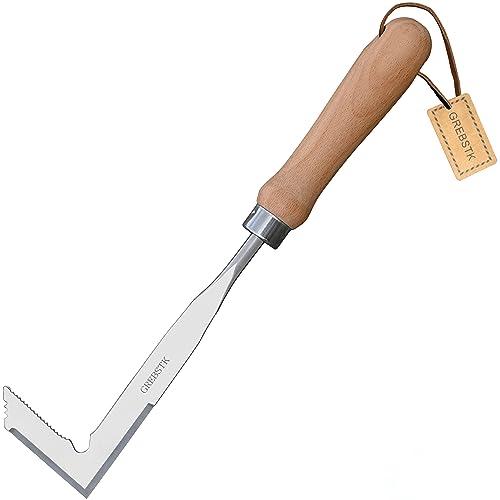



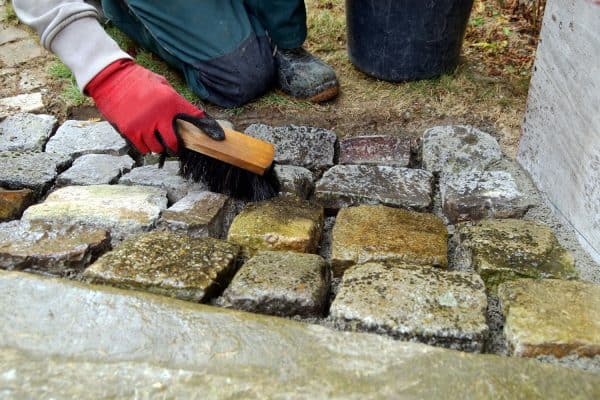
![Blue stone pavers on the garden patio, How To Clean Bluestone Pavers [Care & Maintenance Tips]](https://pavingplatform.com/wp-content/uploads/2022/03/Blue-stone-pavers-on-the-garden-patio-600x400.jpg)
![washing services - block paving cleaning with high pressure washer - Can You Pressure Wash Travertine Pavers? [Best Cleaning Methods]](https://pavingplatform.com/wp-content/uploads/2022/03/washing-services-block-paving-cleaning-with-high-pressure-washer-600x400.jpg)